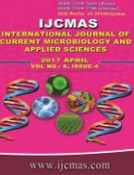


 National Academy of Agricultural Sciences (NAAS)
National Academy of Agricultural Sciences (NAAS)

|
PRINT ISSN : 2319-7692
Online ISSN : 2319-7706 Issues : 12 per year Publisher : Excellent Publishers Email : editorijcmas@gmail.com / submit@ijcmas.com Editor-in-chief: Dr.M.Prakash Index Copernicus ICV 2018: 95.39 NAAS RATING 2020: 5.38 |
The influence of Black Sea deep-water organo-mineral sediments (sapropels) on the quantities of basic for soil fertility trophic groups of microorganisms at cinnamon рseudopodzolic soil (Planosol) was investigated. The study was conducted in conditions of pot experiments with cultivating oriental type tobacco. Sapropels were added in an amount of 30 g / kg dry soil.Soil samples for microbiological analysis from rhizosphere zone of tobacco plants were taken. Totality of microbiological indicators that characterize the general biogenicity in soil environments, mineralization processes and some transformations of nitrogen compounds in the soil have been explored.A positive impact from sapropels upon microflora in cinnamon psevdopodzolic soil (Planosol), resp. at its biological properties was found. The total population density at the microbial community as a whole is increased to16.47%.The factor - "sapropels" strongly stimulate the quantitative development of the following trophic groups of microorganisms with statistically proven power of impact: at ammonifying (98.95%), at assimilating ammonium and nitrate nitrogen (68.86% and 55.90%), at Azotobacter (64.33%) and at Actinomycetes (68.99%). The mineralization processes dominate in the soil microcoenoses, at low degree of oligotrophic, suggesting accumulation of an assimilable by plants nutrients.
 |
 |
 |
 |
 |